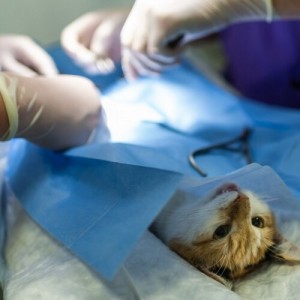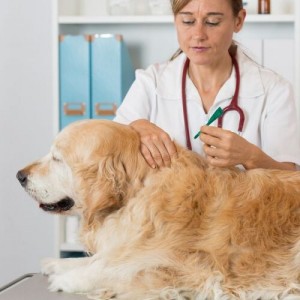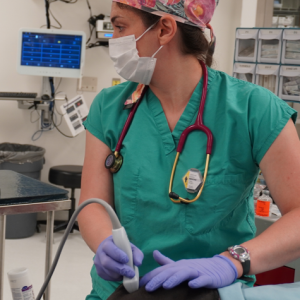Equine Fear Free Certification
The Fear Free organization strives to prevent and alleviate fear, anxiety, and stress in pets by inspiring and educating the people who care for them. In July 2021, the organization launched an equine certification program, to allow veterinary professionals who care for horses to participate in this concept. Behavioral training is often neglected in veterinary training, and this course provides much needed information to show participants how to examine equine patients safely by using gentle techniques, performing routine procedures in non-threatening ways, recognizing stress in equine patients, and helping owners train their horses to cooperate in their care.
Equine Fear Free course
The equine Fear Free information is presented in eight one-hour modules, which are RACE-approved continuing education hours.
- Behavior basics and equine body language — The best way to safely work with horses is to understand their natural behavior and body language. A handler who can predict when a horse will be aggressive or spook is better able to respond, and avoid a dangerous situation or prevent the behavior. The course describes common equine behaviors and provides a detailed equine body language chart.
- Fear Free core concepts — Implementing Fear Free techniques while providing necessary medical care requires key concepts, including communication, a considerate approach, gentle control, and a touch gradient. These terms are defined in the module, and putting the physical examination steps in order, based on the touch gradient principles, is explained. The emotional medical record is also explained, detailing what should be recorded, and when the information should be consulted.
- Transportation of horses — Transporting horses can be extremely stressful for horses and their owners. Some horses are reluctant to load a trailer, potentially escalating a frustrating situation to a much more upsetting level. Techniques that make the process easier are demonstrated.
- Fear Free hospital environment — Changes can be made in the hospital environment to decrease equine stress. These concepts include:
- Traffic flow — Ensure horses are unloaded in a quiet area, provide equine exam and treatment spaces separated from regular human traffic, and separate horses from vehicles.
- Social stressors — Reduce social stressors by eliminating fear-inducing social cues and reinforcing positive feedback. Design housing so healthy horses can see each other for reassurance, create wide barn aisles, separate medical barns by sex, house stallions away from other horses, create partially open treatment and exam areas to prevent horses from feeling physically isolated, and reassure newly arriving horses by keeping a calm, veteran horse in their sight-line.
- Horse’s sight — Create spaces designed for the way the horse sees. Use lighting in work spaces that is even and has a spectrum similar to natural sunlight, and always allow horses to see what is coming.
- Safe flooring — Ensure the floor surface is even, unobstructed, and uniform. Prevent slipping with rubber matting and poured soft floors specifically designed for horses.
- Odors and ventilation — Separate surgery and procedure room air flow from the exam and work-up areas, use natural ventilation, separate dirty utility spaces (e.g., necropsy rooms and laundry rooms) from exam and treatment spaces, use gentle disinfectants, and place manure and trash away from the main building. - The horse owner’s role — This module covers tips veterinary professionals can share with horse owners, to help them train their horse to safely participate in their own health care. Desensitization and counterconditioning techniques can help horses behave better during veterinary examinations and treatment.
- Equine cooperative care training — Cooperative care involves training a horse using positive reinforcement to not only tolerate handling and husbandry procedures, but to also be an active, willing participant. The key concept is creating a positive experience for the horse.
- Calming medications and therapeutics — Numerous medications and therapeutic agents may help equine patients be more amenable to veterinary attention.
- Acute pain and pain management in horses — Horses who are in pain are less likely to cooperate. Therefore, recognizing when they are in pain and managing their pain appropriately will help facilitate a successful interaction.
Equine Fear Free authors
The equine Fear Free course was written and reviewed by leading experts in equine medicine and behavior.
- Staci Boswell, DVM, DACVS-LA — Dr. Boswell graduated from the Virginia-Maryland College of Veterinary Medicine and completed an internship at North Carolina State University. She then became a post-doctoral research associate in the Comparative Orthopedic Laboratory at Cornell University, and completed a large animal surgical residency at the University of Tennessee. She is author of The Ultimate Guide for Horses in Need: Care, Training, and Rehabilitation for Rescues, Purchases, and Adoptions.
- Tamara Grubb, DVM, PhD, DACVAA — Dr. Grubb, who is a Diplomate of the American College of Veterinary Anesthesia and Analgesia, has a strong focus in pain management. She owns an anesthesia and analgesia continuing education consulting practice that serves small and large animals. She is the International Veterinary Academy of Pain Management president-elect, and Veterinary Anesthesia and Pain Management for Nurses and Technicians co-author.
- Nita Hynes, DVM — Dr. Hynes received her DVM from the University of Calgary, Canada, where she participated in equine and cattle welfare research and pursued additional training in animal behavior and training. She is a Fear Free level three certified veterinarian and a member of the International Association of Animal Behavior Consultants.
- Claudia Richter, DVM, ACVB Resident — Dr. Richter graduated from the University of Munich, Germany, and completed an internship at the Western College of Veterinary Medicine. She is currently working toward becoming an American College of Veterinary Behaviorists Diplomate.
- Sherrie Yuschak, RVT, VTS-Behavior — Ms. Yuschak has 20 years’ experience as a registered veterinary technician and is board specialized in animal behavior. She is currently a Karen Pryor Academy faculty member.
Veterinary professionals who complete this equine Fear Free course will gain invaluable insight into preventing and easing fear, anxiety, and stress in their equine patients, to allow for easier veterinary care.








List
Add
Please enter a comment